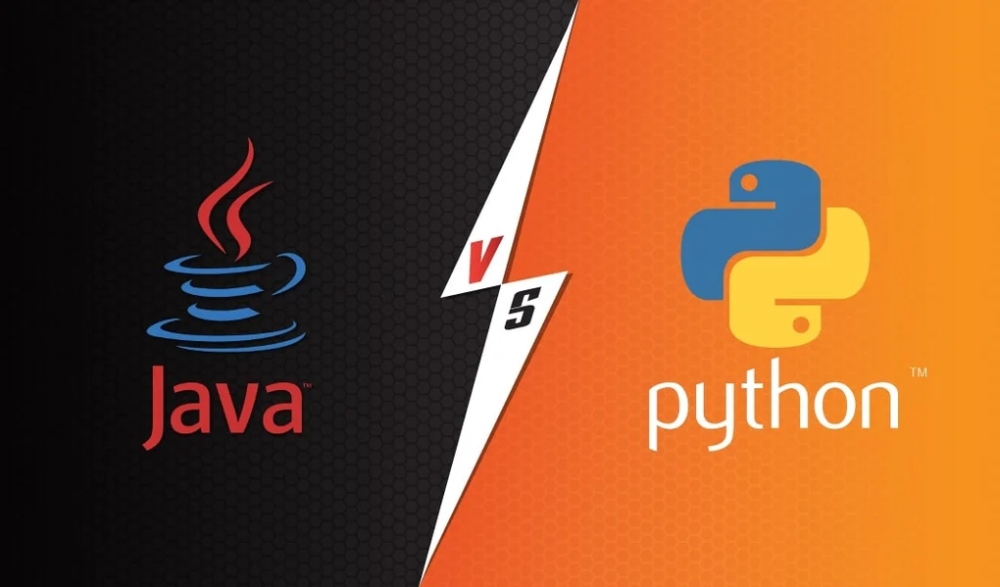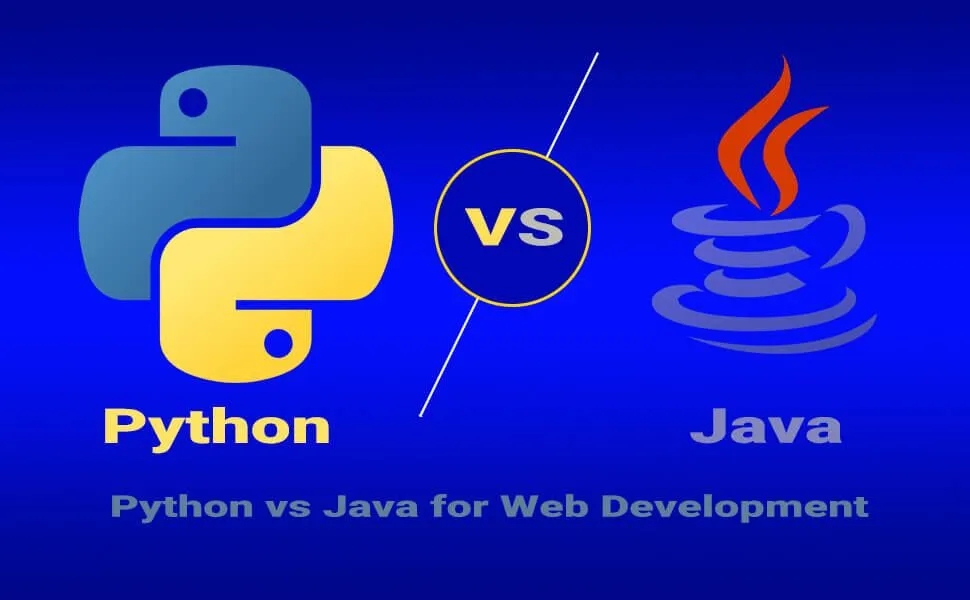
Java vs Python for web development: Which is better in 2025?
Java vs Python for web development is one of the most debated choices in 2025. Both languages are mature, powerful, and widely adopted, but they serve different goals. Java is renowned for its scalability, performance, and enterprise-grade security, while Python excels in rapid development, AI/ML integration, and startup-friendly simplicity.
In this guide, we provide a clear, side-by-side comparison of Java and Python for web development, helping you choose the best fit for your specific project requirements, whether you’re building an MVP or a mission-critical enterprise system.
1. When to choose Java? When to choose Python?
Both Java and Python are versatile tools backed by strong ecosystems and developer communities. However, the “better” option depends entirely on your project’s context, such as time to market, system complexity, performance demands, and long-term scalability.
Let’s explore the best use cases for each.
1.1 Choose Python for web development if
Python distinguishes itself as an excellent choice when speed, flexibility, and ease of integration are priorities.
Ideal use cases:
- Rapid development (startups, MVPs): Python’s concise syntax and vast libraries accelerate development cycles, ideal for startups and fast-moving teams iterating on minimum viable products (MVPs).
- AI/ML or data analytics integration: With first-class support for machine learning and data science (e.g., TensorFlow, Pandas, scikit-learn), Python is the go-to choice for intelligent, data-driven web apps.
- Readable, concise code: Python emphasizes human-readable syntax, making collaboration and maintenance easier, especially in cross-functional teams.
- Content-focused or data-driven applications: Frameworks like Django are perfect for CMS platforms, analytics dashboards, or applications requiring complex data interactions.
Examples of platforms using Python for web: Beyond widely recognised giants like Instagram, Reddit, and Dropbox, numerous other platforms leverage Python’s capabilities:
- PADI Travel: Global scuba diving travel platform
- MoneyPark: Swiss mortgage broker with advanced analytics
- Scoperty: Real estate search and valuation tool in Germany
- Azyan: Real-time food delivery service in Jordan
1.2 Choose Java for web development if
Java remains the dominant choice for enterprise environments that prioritize performance, stability, and security.
- Highly scalable, enterprise-grade applications: Java’s robust, modular architecture and JVM execution make it ideal for large-scale platforms with millions of users.
- Multithreading or robust security: Java supports concurrent processing and offers built-in security APIs, making it suitable for high-throughput, regulated systems.
- Financial, government, or telecom software: Mission-critical sectors favor Java for its reliability and long-term maintainability under strict performance and compliance needs.
- Long-term stability and type safety: Java’s static typing helps prevent errors during compile time, ensuring cleaner, more maintainable codebases for long-term projects.
Examples of platforms using Java for web: While LinkedIn, eBay, and Netflix are prominent users, Java’s reach extends to a diverse array of platforms:
- EveryDollar.com: Budgeting platform built with Spring Boot
- Yatra.com: Indian travel agency using Spring MVC
- Michaels.com: Major retail site using Spring-based architecture
- Accenture Finland: Internal and client-facing Java projects
- Reaktor Innovations: Boutique IT firm building Spring-based systems

Netflix is one of the platforms using Java – Source: vneconomy.vn
2. Head-to-head comparison between Java vs Python for web development
To help clarify the distinction between Java and Python, here’s a detailed comparison across critical factors:
| Criteria | Java | Python |
| Language type | Statically typed, compiled (runs on JVM) | Dynamically typed, interpreted |
| Performance & speed | ✅ Fast runtime, low latency, efficient memory | ⚠️ Slower execution, higher memory usage |
| Syntax & readability | ⚠️ Verbose, strict, better error checking | ✅ Clean, concise, readable like English |
| Learning curve & dev speed | ⚠️ Steeper learning curve, slower to start | ✅ Easy to learn, great for rapid prototyping |
| Popular frameworks | Spring Boot, Jakarta EE | Django, Flask, FastAPI |
| Scalability | ✅ Proven for enterprise-level, concurrent systems | ⚠️ Scalable, but not as efficient for compute-heavy loads |
| Community & ecosystem | Mature, enterprise-focused, wide support | Fast-growing, strong in AI/ML and web development |
| Security | ✅ Strong built-in features, excellent for sensitive data | ⚠️ Framework-dependent, requires best practices |
| Best use cases | Banking, telecom, ERP, large-scale web platforms | MVPs, AI-powered platforms, analytics dashboards, CMS |
| Common beyond-web use cases | Android apps, big data, embedded systems | Data science, ML, automation, DevOps scripting |
>>> Whether you’re building a lean MVP or a complex enterprise system, our experts at PowerGate Software can help you select and implement the optimal technology. Explore our services:
3. Frequently asked questions
3.1. Is Java or Python better for backend development?
Neither language is universally “better.” Java is superior for secure, high-performance enterprise systems. Python excels in fast development cycles and AI/data integration. Choose based on your priorities.
3.2. Can I use both Java and Python in the same project?
Yes. Many projects adopt a microservices architecture where different services are built using different languages. For example, use Java for your core transaction system and Python for the AI module.
3.3. Java or Python is more future-proof for web development?
Both. Java is evolving (e.g., modular JDK, cloud-native support) and dominates legacy and enterprise systems. Python is exploding in data/AI and remains the top choice for new-age apps and startups.
3.4. Is Python good for enterprise web apps?
Absolutely, especially for data-centric platforms, fast-moving startups, or AI-integrated solutions. While Java still leads in legacy enterprise deployments, Python is increasingly adopted in modern enterprises.
3.5. What are the main pros and cons of Java and Python?
Java:
- Pros: High performance, great scalability, built-in security, strong type safety
- Cons: Verbose syntax, slower initial development, steeper learning curve
Python:
- Pros: Fast development, readable syntax, AI/ML integration, strong community
- Cons: Slower runtime, global interpreter lock limits true multithreading

Choosing Java or Python is a pivotal decision for any web development project – Source: boomdevs.com
Choosing the right backend language is a pivotal decision for any web development project. The choice between Java and Python for web development is not about superiority; it’s about fit.
- Choose Java if you need rock-solid stability, security, and high performance for large, long-term systems.
- Choose Python if your project demands flexibility, AI/data integration, or rapid iteration in a startup environment.
Both are future-proof, versatile languages that will continue to thrive in 2025 and beyond.
|
Founded in 2011, PowerGate Software is a global software development company headquartered in Hanoi, Vietnam, with offices in the U.S., U.K., Canada, and Australia. Recognized as a leading name among software development companies in Vietnam, PowerGate specializes in custom software, mobile and web applications, AI, blockchain, cloud solutions, and ERP systems. With over 250 projects successfully delivered across healthcare, fintech, and education, we empower startups and enterprises through dedicated development teams and full-cycle product engineering services. |

